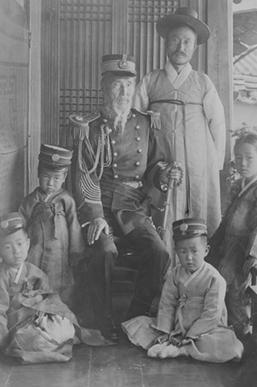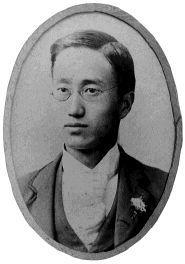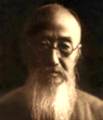Yun Chi-ho facts for kids
Quick facts for kids
Yun Chi-ho
|
|
|---|---|
| 윤치호 尹致昊 |
|

Yun with his family c. 1910. Yun Chi-ho is standing at the rear. His father, Yun Ung-nyeol is seated, wearing the western uniform of the Korean Empire.
|
|
| Born | 23 January 1864 |
| Died | 6 December 1945 (aged 80) |
| Korean name | |
| Hangul |
윤치호
|
| Hanja | |
| Revised Romanization | Yun Chi-ho |
| McCune–Reischauer | Yun Ch'iho |
| Art name | |
| Hangul |
좌옹
|
| Hanja | |
| Revised Romanization | Jwaong |
| McCune–Reischauer | Chwaong |
| Courtesy name | |
| Hangul |
성흠, 성흠
|
| Hanja |
聖欽, 成欽
|
| Revised Romanization | Seongheum, Seongheum |
| McCune–Reischauer | Sŏnghŭm, Sŏnghŭm |
Yun Chi-ho (Korean: 윤치호, hanja: 尹致昊, 1864 – 1945) was an important person in Korean politics and thought during the late 1800s and early 1900s. His penname was Jwa-ong; his courtesy name was Sungheum. Yun was a key member of groups that wanted to change and update Korea, like the Independence Club and the New People's Association.
In his younger years, he was a strong supporter of Korea's independence and worked to make the government more modern. He also held many government jobs and helped spread Christianity in Korea. However, as Japan gained more control over Korea, Yun's views seemed to change. Because he didn't support later independence movements, some Koreans today see him as someone who cooperated with the Japanese.
Yun Chi-ho came from a well-known noble family in Korea. He was the son of General Yun Ung-nyeol, who was a minister in the Joseon government. Yun Chi-ho studied at Vanderbilt University and Emory University in the United States. He was also an early leader of the Korean YMCA and a Methodist Christian.
Contents
Early Life and Education
Yun Chi-ho was born on December 26, 1864, in a village in Asan, Korea. His father, Yun Ung-nyeol, was a government official. He made sure Yun Chi-ho received a good education. Yun Chi-ho was very good at studying old Korean texts and even tried to take government exams at age twelve.
His family was one of the most famous noble families of the Joseon dynasty. His great-great-great-great-great-great-great-great-grandfather, Yun Doo-su, was a top government official. Yun Chi-ho's father, however, was born outside of marriage. From 1871 to 1878, Yun studied at a private school.
Learning in Japan
In 1881, when Yun was sixteen, his father helped him join a group traveling to Japan. They went to see how Japan was quickly becoming a modern country. This trip greatly influenced Yun. He often wrote in his diaries about how much he wanted Korea to become as advanced as Japan.
Studying in China
Later, in 1885, Yun went to Shanghai, China. He studied English and math at the Anglo-Chinese College. While there, he became a Christian. This was a big part of his life. Yun believed Christianity could help Korea become more modern, like Japan and Western countries.
Time in America
In 1888, Yun went to America to study at Vanderbilt University and then Emory University. He liked many things about American culture. But he also faced unfair treatment because of his race, especially in the Southern states. He noticed how people talked about equality but still showed prejudice. While in America, he studied English, religion, and public speaking. He became very good at English and wrote most of his diaries in it.

Serving the Government
Yun held several important government jobs during his life.
Working as an Interpreter
He worked as an interpreter for Lucius Foote, the first American Foreign Minister in Korea. Foote asked the Japanese Foreign Minister for help finding an interpreter. The Japanese minister, who knew Yun, suggested him for the job. Foote also helped Yun arrange his studies in Shanghai.
Trip to Russia
Yun traveled to the Russian Empire with other government officials, including Min Young-hwan. They went to attend the crowning of Nicholas II. They traveled to Europe from the port of Incheon.
Vice President and Exile
Yun also served as the Vice President of the Joseon Court's Privy Council in 1898. However, he was sent away in 1899 because other groups in the government disagreed with him. While in exile, Yun worked as a local leader in a town called Wonsan in Northern Korea. His exile did not last long. In 1903, he was asked to serve as the Vice Foreign Minister.
Korean Independence Efforts
When Yun returned to Korea, small groups of scholars were starting to ask for changes in society and government.
The Independence Club
Yun joined one of these groups, the Independence Club. This club taught Koreans about their history and promoted the use of Hangeul, the Korean alphabet. They also pushed for government reform. Yun wanted the government to better represent its people. He even supported making King Kojong an emperor. However, the club faced pressure from opposing groups and broke up in 1899.
The Enlightenment Movement
As Japan's influence grew in Korea, Yun also supported groups in the Enlightenment Movement. These groups, like the Korean Self-Strengthening Society, continued the work of the Independence Club. Yun helped them by giving speeches and writing articles. These groups gave Yun hope for a stronger Korean society, even when he was in exile.
Yun signed the Japan–Korea Agreement of August 1904 as the acting Minister of Foreign Affairs. He was against the Eulsa Treaty, which made Korea a protectorate of Japan. He said that those who signed it would be seen as traitors. He was surprised when the treaty was signed and praised Han Kyu-seol, who was the only one against it until the end.
Japanese Control of Korea
In 1910, Japanese military forces took over the Korean Empire. Yun Chi-ho joined others in resisting the Japanese occupation. He became a speaker against imperialism and an independence activist. In 1911, he was accused of trying to assassinate the Japanese Governor-General of Korea. He faced harsh treatment because of the 105-Man Incident.
In 1913, he and 104 others were accused of plotting against the Japanese Governor-General, Count Terauchi. He was one of six people found guilty and sent to prison for a long time. His time in prison made him less open about his strong nationalist feelings. However, he was still seen as active in the independence movement.
Trial and Prison Time
In 1911, Yun was linked to a plan to assassinate the Japanese governor-general. Japanese officials were told by some groups Yun had been part of that he helped plan this. He was put on trial and given a very long sentence. But after more trials, his sentence was shortened. He was eventually set free after only six years in jail. He didn't write in his diaries during this time. His experience in the Japanese prison seemed to change his actions after he was released. After his release, Yun Chi-ho started making many statements that supported Japan and gave less support to Korean nationalist movements.
The March 1 Movement
On March 1, 1919, many Koreans protested peacefully to show they wanted independence from Japan. This was inspired by Woodrow Wilson's idea of "self-determination." Yun believed that European countries would not take this protest seriously. He said that Koreans should focus on education and building a stronger society rather than just protesting. He felt that buying land, sending children to school, and leading people to a good religious life were more helpful than stirring up political protests.
Supporting Japan
Yun's change in opinion became even clearer when he started supporting Japan's war efforts during World War II. He encouraged young Korean men to help Japan win the war. He celebrated when Japan pushed Western powers out of Asia. Yun believed that being part of the Japanese Empire gave Koreans opportunities and access to education and resources they didn't have before. He said that Koreans could develop in new ways by joining with the Japanese.
During the Asia-Pacific War
In 1936, members of a Korean enlightenment group were arrested. Yun personally promised that these members would not cause trouble in the future, and they were all released. He also tried to help Ahn Chang-ho, another activist, get released from prison, but he was not successful. In 1938, a similar situation happened, and Yun again helped members get released.
During the time Japan ruled Korea, Yun was often against Japanese rule. He did not attend many official Japanese government events. In 1940, he was questioned for not attending these events.
In 1939, the Japanese government ordered Koreans to change their names to Japanese names. Yun tried to get this order delayed because he knew Koreans would be upset. The Japanese government agreed to delay it for a year. In May 1940, his family had to attend a meeting where his family name was changed to Ito. His new Japanese name was Ito Chikho.
After the Japan–Korea Treaty of 1910, Yun often did not attend Japanese official events. In the 1940s, he was questioned by the Japanese government and watched closely. In 1943, he was forced to become an advisor to the Japanese Governor-General's Privy Council.
Death
In 1945, Yun was chosen to be a member of the Japanese House of Peers. However, Korea gained independence from Japan later that year when Japan surrendered.
In October 1945, he sent a letter called "An Old Man's Ruminations" to John R. Hodge and also to Syngman Rhee and Kim Gu. He did not get a reply from any of them. In November 1945, he returned to Korea and died in Kaesong in December. He was 80 years old.
Yun Chi-ho was the uncle of Yun Bo-seon, who became the President of South Korea in 1960. He was also the uncle of Yun Il-seon, the first Korean pathologist.
Images for kids
-
Yun's nephew, Yun Bo-seon
See also
 In Spanish: Yun Chi-ho para niños
In Spanish: Yun Chi-ho para niños
- Chang Myon
- Chinilpa
- Kim Kyu-sik
- Kim Ok-gyun
- Park Jung-yang
- Park Yeong-hyo
- Yun Chi-Oh
- Yun Chi-Young
 | Lonnie Johnson |
 | Granville Woods |
 | Lewis Howard Latimer |
 | James West |
















